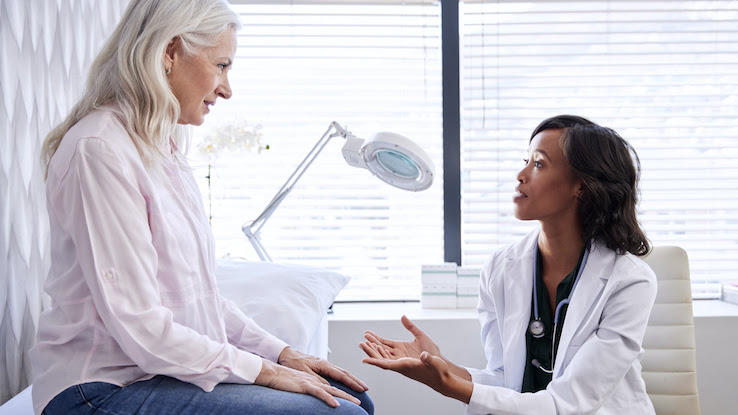What is the Easy Exam to Start With

Regular physical exams help your doctor track any changes in your body that may mean you have an underlying disease or condition. Without regular check-ups, you might not know you have a health condition. When an illness or health condition starts out, you might not have any symptoms. And, you may overlook developing symptoms until the condition is in later stages.
Many health conditions are easier to treat when your doctor diagnoses them earlier on. Having regular physical exams can help your healthcare provider catch and treat health concerns earlier. This may keep you from needing more extensive treatment. You can discuss any questions you have about health conditions by visiting your doctor for a regular physical exam.

Before meeting with your doctor, you'll start with a nurse. They'll take your blood pressure and check your body temperature. The nurse will record the results in your medical file. Your doctor will look at these results before they talk to you.
When your doctor comes in to examine you, they'll ask you some general health questions. Then, they'll record any information you tell them in your medical file.
Your doctor might ask you about the following during your exam:
- Sexual health
- Exercise habits
- Smoking habits
- Any past injuries
- Any past surgeries
- Family medical history
- Alcohol and drug usage
- Number of past pregnancies
- The line of work you're currently in
- Any allergies to food or medications
- History of prior illnesses or medical conditions
The doctor will ask you if you have any health concerns that you want to discuss. You can ask questions or talk about any issues you're experiencing.
During your exam, your doctor will look at your skin. They'll use a stethoscope to listen to your heart. This helps them check for signs of possible heart disease. They'll also listen to your lungs to check for possible signs of lung disease. Your doctor will use several tools to check your ears, nose and throat and make sure they're healthy. You can expect the doctor to check your teeth, gums and throat. They'll also look into your eyes to check for potential issues.
All these practical but straightforward tests can give your doctor clues about your health. They also help your doctor figure out if something doesn't look typical or may be a sign of a developing health condition. In addition, there are some other simple tests your doctor might do during a physical exam for women:
- The doctor will feel your neck to check different glands. They'll also check your arteries.
- The doctor will use their hands to apply light pressure to your abdomen. This helps them check your liver's size and find out if you have any tenderness.
- Your provider may listen to your bowel sounds via a stethoscope.
- The doctor might tap your knees or arms with a small rubber hammer. This helps them check your reflexes.
- Your doctor may perform a breast exam. This can involve feeling your breasts to check for lumps. They may also look at your breast tissue to check for areas of concern.
- Your provider may check your balance, muscle strength and coordination. This helps them detect possible warning signs of different conditions.
Your doctor may do a variety of lab tests. This helps them rule out any possible underlying medical conditions you might have. Blood tests may include:
- Glucose levels
- Pregnancy test
- Chemistry panel
- Thyroid function test
- CBC (complete blood count)
- Iron levels to check for anemia
Your doctor might also ask you to do a urine test or have chest X-rays done.
Preparing for Your Exam Visit

It's helpful to head to your appointment prepared. Your doctor will ask many different questions to accurately assess your health. They'll also need to gather information about your health history to determine your risk level for developing certain health conditions. It's important that you tell your doctor accurate information — to the best of your ability.
Come to your appointment prepared to talk about things like your family's health history. This will give your doctor clues about what conditions you might be more likely to develop. Stroke, heart attack, diabetes and cancer are some examples of conditions that you may be more likely to develop if one of your family members has or had them.
Bring a complete list of all prescription and over-the-counter medications you take or recently stopped using. You'll also want to include any vitamins, dietary supplements or herbal remedies you take. Your doctor needs this information to get a full idea of your health.
Also, be prepared to talk about any health concerns you want to address. In the weeks before your appointment, pay attention to and record how often you're experiencing any symptoms. Take note of what you were doing before the symptoms occurred. Note down whether they appear to increase when you eat certain foods or take certain medicines.
How Often Do You Need a Physical Exam?

Physical exams are a type of preventive medicine. This means they can help your doctor notice signs and symptoms of health conditions before those conditions have a chance to get worse. Physical exams can also help you and your doctor keep tabs on your health and promote better wellbeing.
To get the most from physical exams, you should schedule one once a year — or as often as your doctor says you need them, depending on your overall health. A yearly physical helps your doctor detect changes in your body. And, if necessary, they can begin treating those changes to keep you healthy.
If your doctor notices changes, you might just need to make a simple lifestyle change — like modifying your diet if you have high cholesterol. Other times, they may notice early warning signs of something that needs further testing or treatment.
Specific tests will become part of your routine exam as you age:
- At age 35, your doctor may begin paying closer attention to your thyroid.
- At age 40, they should routinely check your cholesterol levels. In some cases, you might need regular mammogram screenings for breast cancer.
- By the age of 50, you should get a colonoscopy.
- At age 65, you should take a bone density test to check for osteoporosis.
If you menstruate, you may be at risk of developing iron deficiency anemia because of the blood loss that happens during your period. This condition often has mild symptoms. You might not even notice them or have them at all. Common symptoms include fatigue, chills, muscle aches and irritability. If you have heavy bleeding during your period, you may need to schedule physical exams more often. This way, your doctor can keep a closer eye on your iron levels.
Resource Links:
"Health check-up program for pre/postmenopausal women at Siriraj Menopause Clinic," Journal of the Medical Association of Thailand via the National Library of Medicine
"Socioeconomic differences in health check-ups and medically certified sickness absence: a 10-year follow-up among middle-aged municipal employees in Finland," Journal of Epidemiology and Community Health via the National Library of Medicine
"Participation in preventive health check-ups among 19,351 women in Germany," Preventive Medicine Reports via National Library of Medicine
"Prevalence of and factors related to anemia among Japanese adult women: Secondary data analysis using health check-up database," Scientific Reports via the National Library of Medicine
"Evaluation of health status of a population underwent routine medical check up at the high risk screening clinic in National Cancer Institute," Asian Pacific Journal of Cancer Prevention via the National Library of Medicine
"Participation in health check-ups and mortality using propensity score matched cohort analyses," Preventive Medicine Reportsvia the National Library of Medicine
Source: https://www.symptomfind.com/healthy-living/physical-exams-women?utm_content=params%3Ao%3D740013%26ad%3DdirN%26qo%3DserpIndex&ueid=eae07010-000d-4a91-a875-fdea29988edc
0 Response to "What is the Easy Exam to Start With"
Post a Comment